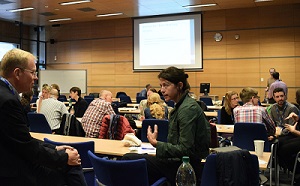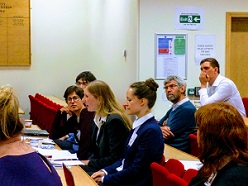Tips and Tricks for Academic Networking
Networking is becoming an increasingly important skill for academics. Christopher Huggins shares his tips and tricks for postgraduates and early-career researchers.
Why is networking important?
Before getting into what to do, it is worth outlining why networking is worth doing.
Firstly, it improves your scholarship. Your contribution to knowledge requires incrementally building on the work of others. As well as conducting literature searches and reading through copious journal articles and books, connecting with other researchers in your field is crucial for being aware of other research going on around you.
Secondly, as a researcher, you also have a duty to disseminate your own findings, and your research shouldn’t be just for your own personal consumption. If your research is interesting, people will want to know about it. But presenting at a conference or publishing a journal article often isn’t enough. Many articles have poor levels of readership and citations, so it’s important to make sure you promote your research and encourage people to engage with it.
Thirdly, there is now an increasing expectation of collaboration in research, both with academic and practitioner partners. Networking allows you to connect with others and build a body of contacts. This ability to draw on a range of contacts is often a stated requirement in person specifications for academic jobs, so demonstrating you can build a network of academic and practitioner contacts can improve your employment prospects.
This final point is often overlooked, but is equally, if not more, important. It’s often said that doing a PhD can be lonely. You may be the only one in your department working on your particular area. I speak from experience in saying that a PhD can take over your life as you devote most of your time to researching and writing. So it’s a good idea for your own mental well-being to get out into the wider world every now and then and interact with others if only to ensure you remain grounded in reality.
4 practical steps you can take
1. Join an association or learned society
Joining an academic association is the easiest way to get in touch with other researchers working in your field. I am a member of three: UACES, the Regional Studies Association and the Political Studies Association.
Do your homework first and don’t just join any association you come across. Does the association include members working on similar things as you? Do they offer reasonable fees or discounts for PhD students and early career researchers? Do they offer opportunities for training and personal development? Are there funding opportunities? Is there publication support? And, importantly, is there an active early career community which is valued and supported by the association as a whole?
Once you have signed up, don’t be a passive member. Attend conferences and events, and actively take up opportunities to get involved.
2. Get involved at conferences
Heidi Maurer’s ’3 Be’s’ is a must-read for what to do at conferences, but here are a couple of points related to networking that are worth reiterating.
From a networking perspective, remember that your colleagues are based in several different institutions that are geographically dispersed. Conferences, then, bring people together and connect scholars. This benefits your research. It gives you an opportunity to communicate your research to a wider audience beyond your university, and it’s an opportunity to find out from others what they are up to.
But this will only pay off if you actively engage with those around you at conferences. So go to panels (even those which aren’t in your immediate area of research), ask questions and get involved in discussions. If you run out of time in panels you can always follow up interesting questions and discussions afterwards – many conferences produce a delegates list which will include participants’ contact details.


While conferences are an opportunity for developing and getting feedback on your research, they also serve an important social function. Conferences have social activities built into them – coffee breaks, drinks receptions, meals. Use them to connect with people, and, importantly, don’t spend the whole time talking about research.
The large number of participants and the presence of ‘big names’ in your field can make conferences seem daunting, but the reality is that most are welcoming to PhD students and early career researchers. Most will offer a discounted rate for PhD students, and will also organise dedicated sessions or social events for early-career participants.
If you find the prospect of presenting a paper and interacting with colleagues daunting, especially if you’re at an early stage of your PhD, then think about just going along without presenting a paper, to get a feel for what goes on. There are also dedicated postgraduate / early career conferences which aim to introduce you to a conference setting in a supportive environment.
3. Take up workshop and masterclass opportunities
As with conferences, workshops and masterclasses are good opportunities to present and get feedback on your research. Much of the same advice for conferences applies: there are opportunities to interact with colleagues working in your area and you should make the most to talk to them.
The main difference is that workshops tend to be much more highly focused, intense and hard work. On the one hand, this means there’s a greater opportunity to meet those working in your area of research. But it also means you need to be more strategic when deciding which workshops you will participate in.
4. Develop a social media presence
Social media is another tool which can help you network. There are lots of options available. I, like many academics, have a Twitter account which I tend to use for professional purposes, rather than personal. The benefit of this has been not only to connect me with other researchers but also to engage with a practitioner audience too. A lot of my research (previously on local government and now on fisheries policy) has an inherent applied dimension and Twitter has allowed me to connect with people I wouldn’t normally find in a university setting or at an academic conference.
This leads me to a broader point that networking can (and should) go beyond academic circles, especially as there’s an ever-increasing drive for academic research to be ‘useful’ or have an impact in the real world.
Simon Usherwood has some excellent advice on ‘doing’ social media as an academic. This essentially comes down to three rules: be active, have something interesting to say and be yourself (though I will freely admit to often breaking the first two!).
Christopher Huggins | @chris_huggins
These tips are based on the author’s presentation at the UACES Graduate Forum’s Doctoral Training Academy.

